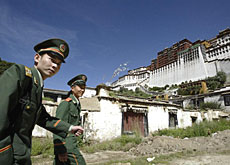Couchepin calls for respect of Tibetan human rights

The Swiss interior minister, Pascal Couchepin, has called on the Chinese authorities to respect human rights in Tibet.
Couchepin, who was in Tibet as part of a week-long official trip to China, also signed an agreement pledging Swiss funds to help in the restoration of a temple.
“Experience shows us that a balanced development can only exist if all aspects of a human being are respected, including religious rights,” said Couchepin.
The minister made the comments at the beginning of his meeting with the governor of Tibet, Xiang Ba Ping Cao.
Couchepin stopped off in Tibet – officially to lend his support to the temple project – ahead of the annual conference of the International Network on Cultural Policy in Shanghai later this week.
China took control of Tibet in 1950 and has designated the region as an autonomous province. But questions have been raised about China’s human-rights record in the mainly Buddhist area.
Remarking on the booming Chinese economy, Couchepin said that although this was very positive for China, there could also be negative effects.
“In a traditional region like Tibet, it may come to a conflict between tradition and modernity, particularly in the domain of religion,” he said.
“Misunderstandings”
For his part, Xiang said he welcomed Couchepin’s visit, adding that Bern had a “good understanding” of the situation in China.
But Xiang said he regretted the “misunderstandings” in the West about Tibet.
“There are not a lot of people in Switzerland who know the truth [about the situation],” he said.
He added that, according to an old Chinese proverb: “Those who know the truth then see it with their own eyes.”
Couchepin also met the mayor of Lhasa during what is his second trip to China in less than a year. On his last visit, he was criticised not tackling the Chinese over human rights.
Cultural heritage
Couchepin, who is also Switzerland’s culture minister, signed a memorandum of understanding on the restoration of the Ramoche temple, which was built in the seventh century before being severely damaged during China’s cultural revolution.
Earlier work by the Chinese authorities allowed 120 monks to return to the temple. The Swiss contribution – SFr200,000 ($160,000) – will pay for the building’s restoration. Work is expected to concentrate on repairing the roofs.
Switzerland has, however, laid down two conditions: the work has to be carried out by Tibetans, using ancient techniques that conform to rules set by Unesco; and the project will be overseen by a Swiss expert, Amy Heller.
The project is a collaboration between the Swiss foreign and justice ministries and has the approval of both the Chinese authorities and the Tibetan religious authorities.
It is also the first time that Beijing has authorised a foreign government to undertake work to preserve Tibetan heritage.
swissinfo with agencies
Couchepin is in China to attend the annual conference of the International Network on Cultural Policy in Shanghai on Friday and Saturday.
The conference deals with the promotion of cultural diversity in a globalised world.
During his trip, Couchepin visited Tibet, officially to support the temple project.

In compliance with the JTI standards
More: SWI swissinfo.ch certified by the Journalism Trust Initiative











You can find an overview of ongoing debates with our journalists here . Please join us!
If you want to start a conversation about a topic raised in this article or want to report factual errors, email us at english@swissinfo.ch.